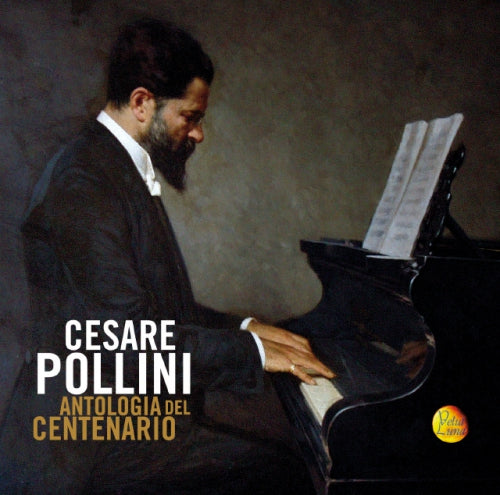Velut Luna
ANTOLOGIA DEL CENTENARIO - POLLINI
ANTOLOGIA DEL CENTENARIO - POLLINI
Genere musicale: Classica
Disponibile
Impossibile caricare la disponibilità di ritiro
ANTOLOGIA DEL CENTENARIO (CVLD247)
Autore: CESARE POLLINI
Esecutore: ORCHESTRA DEL CONSERVATORIO
TRACKLIST
1 - Scherzo in fa maggiore (1880), per orchestra
2 - Notturno in re maggiore (1882), per orchestra
Oreste Ravanello (1871-1938)
3 - Elegia “in morte di Cesare Pollini” (Andante) per archi
4 : 8 - Suite op. 3 in mi maggiore per violino, violoncello e pianoforte
Allegro non troppo / Largo espressivo / Tempo di Minuetto / Mesto (A modo di Romanza) / Presto
9 : 11 - Tre fogli d’album (1903)
Attesa (Presto) / Melanconia (Andante sostenuto quasi adagio) / Prima neve (Andante con moto)
12 - Notturno (Mesto), Nr. 2 da Sei fogli d’album (1878)
13 - Presto scherzoso Nr. 5 da Sei fogli d’album (1878)
14 - Marcia Funebre (Adagio Maestoso) in si bemolle minore (1874)
15 - Romanza (Quasi adagio)
16 : 19 - Sonata in fa minore(1874/1899)
Allegro appassionato / Sostenuto / Intermezzo / Finale (Energico/Assai agitato)
INTERPRETI
Orchestra del Conservatorio “Cesare Pollini” (tracks 1/2)
Giuliano Medeossi direttore (tracks 1/2)
Orchestra di Padova e del Veneto (tracks 3)
Pietro Billi direttore (tracks 3)
Andrea Vio violino (tracks 4-8)
Angelo Zanin violoncello (tracks 4-8)
Aldo Orvieto pianoforte (tracks 4-8)
Maura Mazzonetto pianoforte (tracks 9-14)
Giovanni Tirindelli pianoforte (tracks 15-19)
Note tecniche
Cesare Pollini, figlio del nobile padovano Luigi de’ Pollini, nasce il 13 luglio 1858. Intraprende giovanissimo gli studi pianistici sotto la guida della madre Luigia dei conti de’ Cassis-Faraone. Nel 1878 il conte Pietro Suman invia alcune composizioni di Pollini - fino ad allora praticamente autodidatta - ad Antonio Bazzini, illustre compositore, violinista e professore del Conservatorio di Milano, che lo accoglierà nella sua classe nel 1880 e di cui diverrà presto uno degli allievi prediletti. Due anni più tardi Pollini rientrerà a Padova per assumere la direzione dell’Istituto Musicale, ivi fondato il 29 giugno 1879. Il 5 dicembre 1886 Pollini intraprende una lunga tournée di concerti in Germania con il violinista Antonio Freschi, anch’egli allievo di Bazzini. Il 2 gennaio il duo esordisce a Monaco, ottenendo critiche molto favorevoli, in particolare dal ‘Berliner Tagblatt?. Tra i brani eseguiti anche la Suite op. 3 dedicata a Richard Strauss, presente all’esecuzione. La tournée prosegue alla volta di Francoforte, Stoccarda, Berlino, Vienna. Nel 1889 è invitato dalla regina alla Villa Reale di Monza a tenere un concerto in onore dell’imperatore Guglielmo II e nel 1892 il re Umberto I lo nomina cavaliere dei SS. Maurizio e Lazzaro, facendogli personale consegna delle insegne a Monza. Il 26 gennaio 1912 Cesare Pollini muore improvvisamente all’età di 54 anni. La notizia della sua scomparsa è diffusa dai giornali di tutta Italia. L’istituto padovano decide di darsi nuova denominazione in memoria del suo direttore.
Il mezzo secolo tra l’annessione al regno d’Italia e la prima guerra mondiale è epoca di ripiegamento decadente, un momento storico nel quale la delusione postunitaria si intreccia con il clima di sconforto per la presa di coscienza dell’arretratezza culturale dell’Italia rispetto al mondo d’oltralpe. Anche per Padova è un periodo intensissimo e contraddittorio di riorganizzazione materiale e culturale, di fieri acquartieramenti su posizioni tradizionali, ma anche di aperture audaci e lento cammino di avvicinamento all’Europa contemporanea. Significativa presenza nella vita culturale tra la fine dell’Ottocento e l’inizio del Novecento, Cesare Pollini - sono parole di Arrigo Boito -«occupava fra gli elettissimi cultori dell’arte un grado speciale di eminenza e di nobiltà». Nelle molteplici esperienze acquisite nella sua intensa attività di concertista, compositore e musicologo Pollini aveva coltivato una straordinaria ricchezza di stimoli che mise a disposizione della vita culturale padovana con ammirevole generosità. Forte dell’amicizia con illustri personalità del mondo musicale italiano e tedesco (i già citati Richard Strauss e Antonio Bazzini ma anche Giuseppe Martucci, Giovanni Sgambati, Oscar Chilesotti e molti altri), egli si impegnò con passione nel promuovere la cultura musicale europea in ambito padovano rinnovando le scelte concertistiche e affinando il gusto musicale del pubblico. Da segnalare, a tal riguardo, il suo impegno di organizzatore delle “mattinate musicali” a palazzo Selvatico Estense, cicli di concerti i cui programmi erano volti a presentare il repertorio romantico tedesco, fino ad allora praticamente sconosciuto in Italia e considerato dal pubblico insopportabilmente noioso: «Il programma del concerto suscitò le più serie diffidenze per l’esclusione assoluta di pezzi vocali ed il predominio di autori classici, i cui nomi mettevano i brividi alla gran maggioranza degli amatori e facevano presentire quel terribile tedio che in simili circostanze piomba sempre, come incubo sul capo di cotesti amatori». Padova condivideva con i maggiori centri della Penisola la tensione tra abitudini musicali schiacciate sul teatro e sul consumo da salotto e la volontà pedagogica di un élite di avvicinare cultura e gusto locali ai modelli europei. Significativa a tal riguardo la stesura della Terminologia musicale tedesco-italiana che Pollini pubblicherà nel 1894 per i tipi dei F.lli Bocca di Torino. Numerosi anche i concerti commemorativi organizzati dal maestro nel contesto della programmazione artistica dell’Istituto padovano: per il VII anniversario della morte di Richard Wagner (1890), in commemorazione di Gioachino Rossini e di Giuseppe Tartini (1892), di Anton Rubinstein (1895), di Antonio Bazzini (1897), di Johannes Brahms (1898), di Giuseppe Verdi (1901), di Edvard Grieg (1908).
Share

-

Spedizioni prodotti fisici
Spedizioni gratuite in Europa (UE), a partire da 4 articoli - Richiedere quatozione per i costi di spedizione per i paesi non UE
-

Consegna prodotti digitali
La consegna dei prodotti digitali avverrà direttamente sul sito e riceverai anche una email con il link per il download dei file.
-

Scrivi una recensione
Qui sopra puoi scrivere una recensione sul prodotto che hai acquistato, saremo felici di conoscere la tua opinione.


